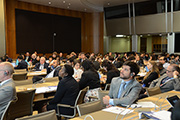
Enhancing the participation of Micro, Small and Medium Enterprises (MSMES) in international trade Tuesday, 21 June, 15:00–18:00 – WTO, Room W
A workshop organized by the Permanent Missions of the Philippines, Lao PDR, Malaysia, Brunei Darussalam, the Republic of Singapore and Thailand with the International Trade Centre (ITC)
Small and medium-sized enterprises (SMEs) constitute the overwhelming majority of firms and are a major source of employment in the economies of WTO members. Globally, SMEs make up over 95% of all firms, account for approximately 50% of value added and 60% of total employment (ACCA, 2010; Ayyagari et al., 2011; Edinburgh Group, 2013).
Micro enterprises, the smallest component of the SME sector, are increasingly the largest sources of employment in many developing countries, especially for women and youth.
MSMEs are especially vulnerable to trade barriers. They typically export in smaller volumes and therefore have higher export-related per-unit costs than bigger firms. Larger firms are more productive, with the productivity gap between small and large firms tending to be much more pronounced in developing countries than in industrialized countries. Closing this productivity gap would lead to significant opportunities for inclusive growth (ITC: SME Competitiveness Outlook 2015).
Although innovation in communications and transportation has dramatically lowered the overall barriers to market entry for small firms, MSMEs continue to lag behind large firms not only with regard to productivity but also level of competitiveness and ability to internationalize. Evidence shows that while around 20% of new firms go out of business after their first year, and just over 50% after five years (Dunne, Robertson and Samuelson, 1988; van Praag, 2003; Knaup and Piazza, 2007; Geroski, Mata and Portugal, 2010), young MSMEs are more likely to survive if they export. If policymakers address the market failures that constitute barriers to trade for MSMEs, the enterprises will be able to become more competitive.
These barriers are complex and can be both internal to a particular firm or emanate from the larger business and trade policy environment in which MSMEs operate.
Workshop Programme
Audio
15:00–15:07 Welcome remarks
H.E. Mr. Esteban Conejos, Jr., Ambassador, Permanent Representative, Philippine Mission to the WTO
15:07–15:15 Opening remarks
Ms. Arancha González, Executive Director, ITC
15:15–15:25 Keynote address
Mr. Roberto Azevêdo, Director-General, WTO
15:25 –15:35 Session 1: Learning to grow: Revitalizing the SME Agenda
Ms. Anabel Gonzalez, Senior Director, World Bank Group Global Practice on Trade and Competitiveness – video message
 |
Learning to grow: Revitalizing the SME Agenda(5m 56s) |
15:35-15:45 Session 2: SME competitiveness: Making trade happen
Ms. Marion Jansen, Chief Economist, ITC
Presentation
15:45–15:55 Session 3: Role of trade policy in the internationalization of MSMEs
Mr. Alejandro Jara, Senior Counsel, King and Spalding LLP, Geneva and former DDG, WTO
Presentation
15:55–16:05 Session 4: Start-ups and Innovation
H.E. Ms. Nora K. Terrado, Vice-Minister of Trade and Industry, Philippines
Presentation
16:05–16:15 Session 5: Complying with Standards and Regulations
Ms. Hafsah Hashim, Chief Executive Officer, SME Corporation Malaysia
Presentation
16:15–16:25 Session 6: Cross-border issues – logistics and trade facilitation
Mr. Carlos Grau Tanner, Director-General, Global Express Association
Presentation
16:25–16:35 Session 7: Helping MSMEs to trade: initial findings of the WTO's 2016 World Trade Report
Mr. Robert Koopman, Chief Economist and Director of Economic Research and Statistics, WTO
Presentation
16:35–17:50 Moderator opens the floor for questions and reactions from participants
17:50–18:00 Synthesis and closing remarks
> Problems viewing this page?
Please contact [email protected] giving details of the operating system and web browser you are using.
